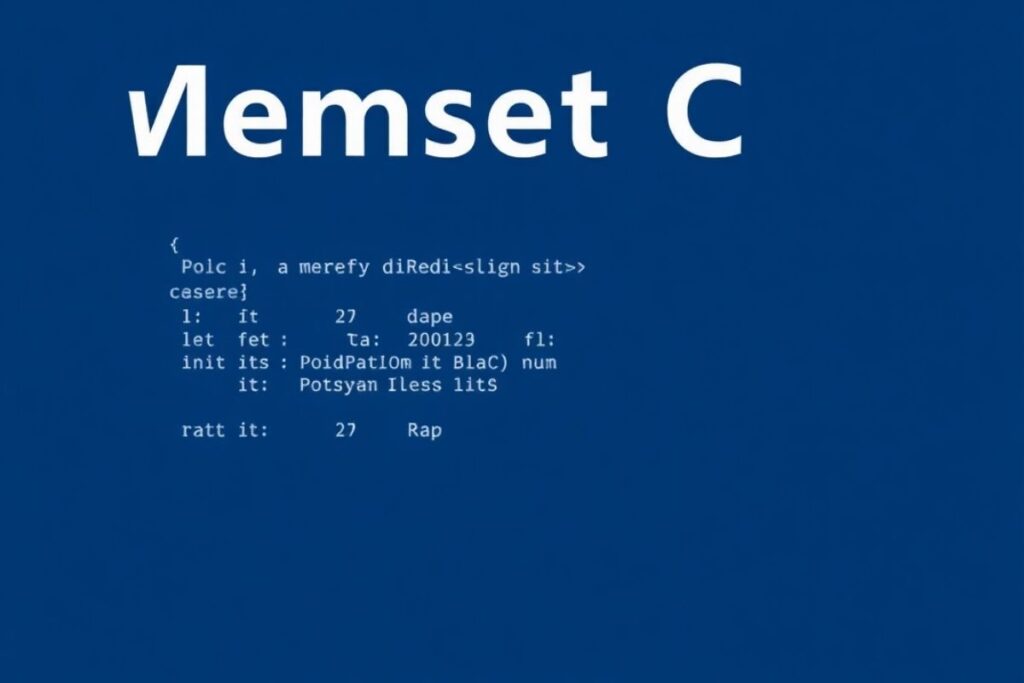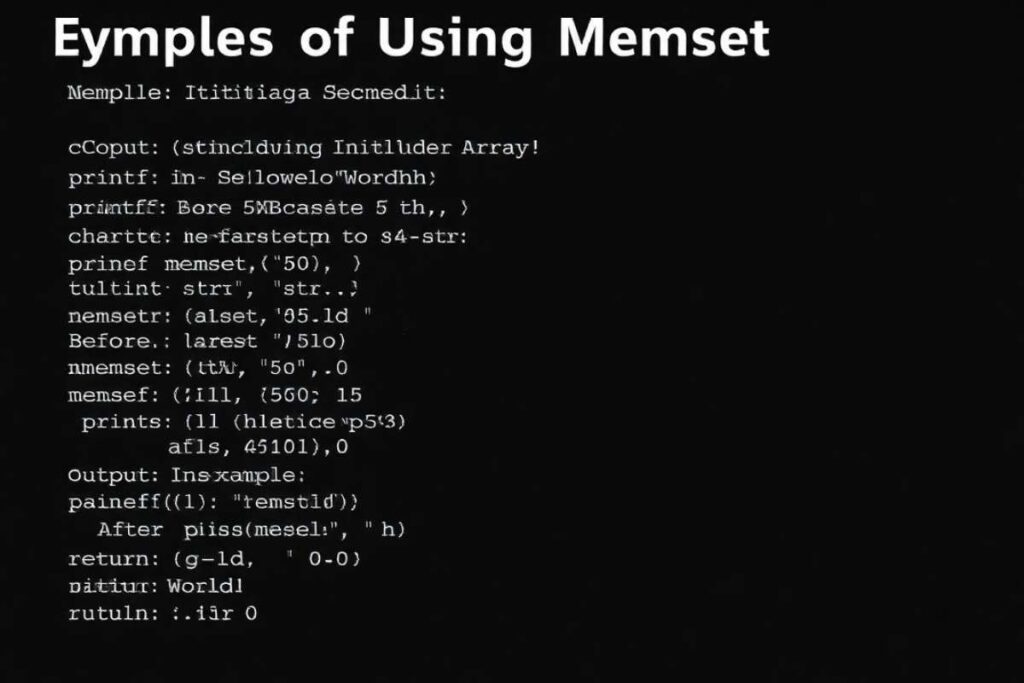In C programming, efficient memory manipulation is crucial for performance and stability. One of the most commonly used functions for this purpose is Memset C.
This function is part of the C standard library and is a powerful tool for initializing and manipulating memory blocks.
In this article, we will dive deep into the syntax, use cases, benefits, and common pitfalls of Memset C, ensuring you use it optimally in your projects.
What is Memset C?

Memset C is a function from the standard C library, declared in <string.h>. It is used to set a block of memory with a specific value.
The Memset () C function is essential for many low-level operations. It is a key tool for ensuring that data is initialized correctly or cleared from memory after use.
The operation is performed at the byte level, meaning it is capable of setting memory in a precise manner.
Syntax of Memset () C
cCopyEdit#include <string.h>
void *memset(void *ptr, int value, size_t num);
Parameters:
- ptr: A pointer to the block of memory that you want to set.
- value: The value to set, which is treated as an unsigned char.
- num: The number of bytes to set.
Return Value:
The function returns a pointer to the memory area ptr that has been set.
Examples of Using Memset
Initializing a Character Array
cCopyEdit#include <stdio.h>
#include <string.h>
int main() {
char str[50] = "Hello, World!";
printf("Before memset: %s\n", str);
// Set the first 5 characters to '-'
memset(str, '-', 5);
printf("After memset: %s\n", str);
return 0;
}
Output:
pgsqlCopyEditBefore memset: Hello, World!
After memset: -----, World!
In this example, memset() is used to set the first five characters of the string str to '-'. This demonstrates how you can manipulate individual bytes within a string.
Zeroing an Integer Array
cCopyEdit#include <stdio.h>
#include <string.h>
int main() {
int arr[10];
memset(arr, 0, sizeof(arr));
printf("Array after memset:\n");
for(int i = 0; i < 10; i++) {
printf("%d ", arr[i]);
}
return 0;
}
Output:
javascriptCopyEditArray after memset:
0 0 0 0 0 0 0 0 0 0
In this example, memset() is used to zero out the entire integer array. Since integers typically occupy more than one byte, using memset() to clear an array of integers is a common use case.
Use Cases of C

Before using a buffer, it’s essential to initialize it to a known state. Memset C is often used to set the buffer to zero or another value, preventing any undefined behavior from uninitialized memory.
Resetting Structures:
Structures in C are often used to hold data in various formats. Memset () C can quickly reset the contents of a structure, ensuring that residual data does not affect the logic of the program. This is especially important in systems with limited memory or when performance is critical.
Security Applications:
In cryptography and other security-sensitive domains, Memset () C is frequently used to clear sensitive data. After encrypting data or performing other operations, Memset () C can overwrite memory areas holding sensitive information, minimizing the risk of accidental leakage.
Game Development:
Game engines often rely on real-time memory management. In these cases, Memset C can optimize memory for rendering operations, setting buffer data to a known state before processing it. This ensures that graphical assets or in-game data are manipulated efficiently.
Embedded Systems:
Embedded systems often have constrained memory resources. Memset can be utilized to manage memory efficiently, allowing developers to control exactly what data is stored in memory, ensuring that only necessary information occupies space.
Important Considerations When Using Memset C

Pointer Initialization
It is not recommended to use Memset C to initialize pointers to NULL. The representation of NULL can vary across systems, and it may not effectively handle this variation. Instead, pointers should be initialized explicitly with the appropriate value:
cCopyEditint *ptr = NULL;
Performance Impact
While Memset C is efficient, excessive use of memset() in high-performance applications may cause unnecessary overhead. It is crucial to balance its use to avoid introducing bottlenecks in time-critical systems, particularly when large blocks of memory are repeatedly set.
Conclusion
Mastering Memset C is an essential skill for efficient memory management in C programming. This function provides a straightforward method for initializing and resetting memory blocks, ensuring predictable program behavior.
Whether you are working on low-level system programming, embedded systems, or optimizing performance for high-speed applications, Memset C is a valuable tool.
Now that you have a solid understanding of Memset C, apply it to optimize your memory management strategies and enhance the performance of your programs. 🚀 Happy coding!
FAQS
What does Memset do?
Memset () C is used to initialize or set a block of memory to a specified value, making it ideal for clearing arrays, structures, or buffers. It is often used in C programs to ensure that memory is in a known state before use.
Is Memset safe to use?
Yes, Memset () C is safe when used correctly. However, you must ensure that the memory is properly allocated and that the number of bytes being set does not exceed the allocated space. Misuse may lead to undefined behavior or memory corruption.
How do I use Memset () C on a pointer?
To use Memset on a pointer, first ensure that the pointer points to allocated memory. Then, you can set the memory block as follows:
cCopyEditint *ptr = malloc(10 * sizeof(int));
if (ptr != NULL) {
memset(ptr, 0, 10 * sizeof(int)); // Setting 10 integers to 0
}
What is size_t used for in Memset ?
size_t is an unsigned data type used to represent sizes and counts. It ensures that the function can handle memory of any size across different platforms, making it portable.
How do I use realloc in C?
Realloc is used to resize previously allocated memory. For example:
cCopyEditint *ptr = malloc(5 * sizeof(int));
if (ptr != NULL) {
int *new_ptr = realloc(ptr, 10 * sizeof(int));
if (new_ptr != NULL) {
ptr = new_ptr;
}
}




